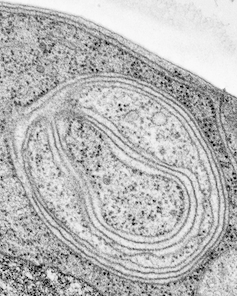Don’t let the textbook diagram of a simplified two-dimensional cell fool you – within this tiny structure of life is a complex universe of molecular machinery that is continually being built, put into motion and eventually broken down.
Cells use the thousands of different proteins within them as tools to shape their internal environment. In this environment are specialized compartments known as organelles that carry out the cell’s functions. Two important organelles within cells are mitochondria and the endoplasmic reticulum, which produce energy and assemble proteins, respectively.

This microscopy image shows an endoplasmic reticulum engulfed by an autophagosome.
Liza Gross/PLoS Biology, CC BY-SA
Since routine cellular activity generates toxic byproducts that can damage the cell, a disposal system is needed to degrade and recycle these molecules within cells. One of these processes is autophagy, a form of self-consumption cells use to eliminate and recycle abnormal or excess components, including proteins and organelles. Derived from Greek, the term literally translates to “self-eating.” In 2016, cell biologist Yoshinori Ohsumi won the Nobel Prize in Physiology or Medicine for his work on autophagy. Autophagy is essential for cellular health and longevity. When this process is not working well, it’s linked to several human diseases, including neurodegenerative and cardiovascular diseases and cancer.
We are researchers studying how autophagy is activated in cells. In our recently published research, we examined two key regulators of this process and identified a unique role one of them plays in degrading mitochondria that may serve as a potential target to treat certain diseases.
Autophagy and human disease
The connection between autophagy and disease is complex and not well understood.
For instance, autophagy appears to play a paradoxical role in cancer. On one hand, some studies have shown that because this process suppresses tumors by eliminating potentially harmful material, reduced or impaired autophagy can turn a cell cancerous. On the other hand, activating autophagy after a tumor has formed can promote cancer by helping it adapt and survive, potentially leading to treatment resistance.
These findings suggest that it is especially important to understand the precise steps and timing of autophagy when it comes to targeting this process as a cancer treatment strategy. Researchers are evaluating the anticancer effects of two malaria drugs, chloroquine and hydroxychloroquine, that block the final steps of autophagy. So far, they have varying efficacy depending on cancer type and stage.
Yoshinori Ohsumi was awarded the 2016 Nobel Prize in Medicine for his discoveries of the mechanisms of autophagy.
Dysfunctional autophagy also plays an important role in most neurodegenerative diseases. The aggregation of…



